About Our Symposium Speakers & Panelists
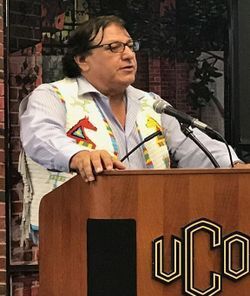
Donovin Sprague
Born and raised on the Cheyenne River Reservation, Donovin is a Minnicoujou Lakota, enrolled member of the Cheyenne River Sioux Tribe, and a descendent of both Chief Hump and Crazy Horse. He is a nationally renowned public historian and educator and has traveled the world to share his knowledge.
Donovin was the head of American Indian Education for the University of Iowa, Iowa State University, and the University of Northern Iowa and is currently a Professor of History at Sheridan College, Sheridan, Wyoming. Sprague’s knowledge of traditional Native American historical sources makes him one of the premier experts on the topics and he has worked with several tribes across the country including the Choctaw Nation and the Citizen Potawatomi Nation of Oklahoma. He is proud of his place in the academic world where he can help people understand primary sources like winter counts and oral stories.
He is also a consultant to museums around the country including the Smithsonian National American Indian Museum and the new Museum of Westward Expansion at the archway in St. Louis, Missouri. His museum historical research and written captions are at the George Heye Center American Indian Smithsonian Museum in downtown New York City. Donovin is also a tour guide, an author of 10 books, an artisan, and a musician. He received a Coat of Arms from the Queen of England and was selected as South Dakota Ziebach County Historian of the Year. He received the Distinguished Scholar Award from the South Dakota Humanities Council, and South Dakota West River History Conference Award (2018). In 1994, the City of Rapid City proclaimed March 23 “Donovin Sprague Day” for his work with improving American Indian/white relations.
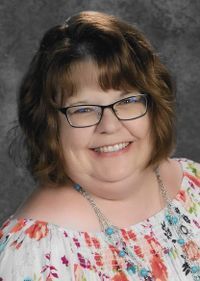
Christine Ambrose
Christine Maloney Ambrose is the co-author of three local history books with Valerie Humphrey--The Mueksch Blacksmith Shop & The Branding Iron Reunion, (2018) Land of Mirages: The History & People of Mirage Flats, (2019) and Memories of the Good Life: Stories from Sheridan & Dawes Counties, (2021). She also writes a history column for the Hay Springs Hip-Hop newspaper, Sheridan County Memories. She has worked for Chadron Public Schools for 14 years, and is currently the Librarian at Chadron Intermediate School. She has one son, Lucas Riley, who is currently attending her alma mater, Chadron State College. Since 2018 she has had a dedicated history Facebook page, Mirage Flats History, where she shares her love of local history. She can be reached at mirage.flats.history@gmail.com.
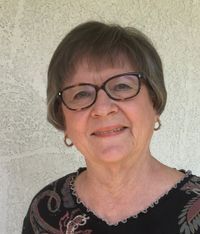
Phyllis Krotz
Phyllis (Jungck) Krotz grew up in Old Jules country southwest of Rushville, NE. She graduated from Rushville High School and Augustana College Sioux Falls and has lived with her husband and sons in Seward, North Platte, and Lincoln NE. At retirement she and her husband James returned to Sheridan County where she began to volunteer at the Armstrong House Museum. In 2019 when the museum accepted a large collection of family records, she helped organize the Sheridan County History Center. The History Center now holds many records of ranches, schools, cemeteries, and families of the county. In 2021 she compiled a book, Rushville; My hometown, with the histories of Rushville families. Krotz is presently working to raise money for the building of an addition to the Armstrong House Museum to house the Sheridan County History Center.
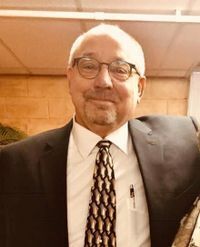
Harlen Wheeler
Harlen Wheeler was born and raised in Gordon, Nebraska. After graduating from high school in 1973, Harlen spent 20 years living in Texas and North Carolina. Returning to Gordon in 1993, he spent the next 10 years pastoring his home church and in 2002 he retired and started a remodeling business with his son. In 2008, he was hired as editor of the Journal Star and worked for a year writing and researching. It was then he got interested in Gordon history and has been reading, researching and writing about local events and history ever since. For 10 years he served as President of the Sheridan County Historical Society and is presently heading up a drive to relocate the Scamahorn Museum along Hwy 20 in Gordon. Harlen is married and has three grown sons. He is working on a historical narrative about Gordon’s first five years.
Mary Clai Jones, Ph.D.
Mary Clai Jones is Associate Professor of English and Humanities at Chadron State College. Her research interests focus on the intersections of gender, material culture, and social geography within late nineteenth-century British Literature. Her current book project, Fashioning Mobility: Navigating Space in Victorian Fiction, is currently being revised and resubmitted for Routledge. “The Forest for the Trees: Vernon Lee’s Environmental Activism” is forthcoming in Vernon Lee: Place Nation Memory with Ohio University Press. “Fashioning Spaces of Play in Victorian Doll Stories” appeared in Nineteenth Century Gender Studies and “Marie Corelli’s Ziska and Fantastic Feminism” is included in Routledge’s edited collection The Female Fantastic: Gendering the Supernatural in the 1890s and 1920s. She teaches both composition and literature classes.
Markus Jones
Markus Egeler Jones graduated with Eastern Kentucky University's MFA. He is an Associate Professor of English at Chadron State College. His first novel, How the Butcher Bird Finds Her Voice, was published in 2018. The novel is an Award Winner in the Multicultural category of the 2018 American Fiction Awards and a finalist in the 2019 multicultural category of the New Mexico Book Awards. His work has also been nominated for a 2018 and 2019 Pushcart Prize and as a finalist for both the 2017 Tillie Olsen Award and in the Literary category of the American Fiction Awards. Along the way he has discovered teaching writing is as fulfilling as writing writing.
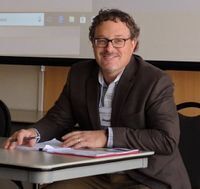
Matt Evertson, Ph.D.
Dr. Matt Evertson is currently teaching, researching, and writing about the regional influences upon the literature of the Great Plains, with a special emphasis on the Environmental Humanities. He is also interested in the role of liberal arts in higher education and interdisciplinary/integrative learning across the curriculum. Dr. Evertson’s earlier scholarship focused on American literary naturalism and a comparative study of Stephen Crane and Theodore Roosevelt. Since returning to Nebraska to teach, his interests have evolved into the ecocritical explorations of Western American writers, particularly those voices of our region in the Great Plains. His current writing projects include an exploration of the ecological themes surrounding “home” and “homes” in the works of Willa Cather, Mari Sandoz, Wright Morris and other Nebraska voices. In his spare time he attempts to write long and short fiction, mostly set in the contemporary West.

Michael Leite, Ph.D.
Mike Leite was committed to a life of science at the age of 5. Growing up in North Dakota, with the benefits of books, exploration of the outdoors, and understanding parents, he discoverd that nature, while awe-inspiring and often daunting, can be comprehensible. Among his role models are Harrison Schmitt, the first geologist to walk on the moon. But he picked geology as a vocation because of the field trips. Field trips were events where like-minded geo-geeks could share the wonders of a world much bigger, and much older than humanly imaginable, and somehow think that was normal. He started his professional life as an oilfield geologist. He never intended to be a teacher (like his father) but fell into that profession because that's where the interesting jobs were. And academia is where basic research is done. Teaching later became a passion. He realized that most people don't have the benefits of an upbringing like his, and some people don't automatically understand their connections to the natural world, and therefore don't understand the consequences of their actions. Among his accomplishments is partnering with colleagues to develop the hybrid (partly online) geoscience program at Chadron State College, including an annual field camp. Before he leaves this world, he hopes to make small strides toward alleviating the climate crisis.
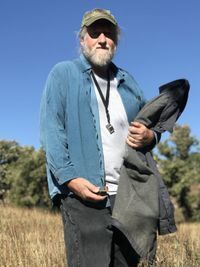
Steve Rolfsmeier
Steve grew up near Seward, Nebraska and did not show much interest in plants until his senior year of high school, when he made a plant collection for advanced biology, and continued to collect as a hobby after graduation. As an undergrad at Doane College, he worked extensively with the college's historical herbarium and eventually got a job working weekends in the University herbarium in Lincoln. A couple of years after finishing a masters degree at the University, he got an opportunity to spend a summer collecting on the Pine Ridge in 1991 and spent much of his off-time volunteering for Ron Weedon in the Chadron State College herbarium. This turned into a yearly gig, and eventually Ron coaxed he and his wife Susan to set up a computerized database for the Chadron State Herbarium in 2003. They both left for Kansas State University for Susan to complete a PhD in 2007, with the thought they would return after she finished. Three years into the program, Ron died unexpectedly and Steve was asked to cover one of his fall courses and manage the herbarium in fall of 2010. He was hired as full-time director of the High Plains Herbarium the following fall. Since then they have added over 10,000 specimens to the collection and are completing digitalization of our plant specimen records which can be accessed online through the Northern Great Plains Herbarium portal.
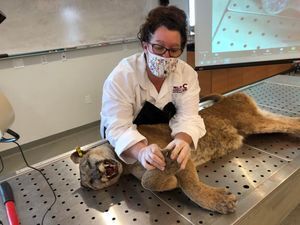
Teresa Frink, Ph.D.
Chadron State College professor Dr. Teresa J. Frink teaches courses in wildlife management in the range program at the school. She graduated from the University of Nebraska-Lincoln with a Bachelor of Science in fisheries and wildlife biology in 2001. In 2004 she earned her Master of Science in wildlife and fisheries science and in 2008 her Doctorate in wildlife science both at South Dakota State University. Frink joined the CSC range program in 2008. Her research interests focus on mountain lions, bighorn sheep, swift fox and spotted skunk. She lives with her husband Ej and daughters Willow and Cedar on a small ranch south of Hay Springs in Old Jules country.
